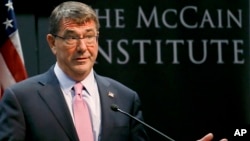U.S. Secretary of Defense Ashton Carter has arrived in Tokyo as part of a weeklong trip to the Asia-Pacific.
During the visit, Carter aims to support allies Japan and Korea while reiterating the U.S. commitment to the so-called Asia-Pacific rebalance, which involves shifting more political and military weight to a fast-growing region.
Carter's trip, which includes stops in Tokyo, Seoul and a visit to U.S. Pacific Command headquarters in Honolulu, Hawaii, comes as the U.S. and China compete for influence among Asian nations.
“The U.S. and China are not allies, but we don’t have to be adversaries," he said.
According to Sheila Smith, author of the new book Intimate Rivals: Japan’s Domestic Politics in a Rising China, the government in Tokyo will want to focus on China’s rise as Japan finalizes new guidelines on defense cooperation with the United States.
“It lives right next door, and we too, with 50,000 American troops on the ground in Japan, have been watching this new power emerge and watching it flexing its military muscles as well," she said.
Tensions between Japan and China have grown as the two argue over disputed islands in the East China Sea. Lingering tensions over issues from World War II have also overshadowed relations in recent years.
Cooperation
Defense officials say the new U.S.-Japan defense guidelines will include cooperation on space and cybersecurity and will form a new coordination center to allow around-the-clock partnership in a range of issues during peace time, in crisis and in war.
Smith says the guidelines run parallel to the Japanese government’s proposed reinterpretation of the country’s constitution, which currently calls for pacifism unless directly defending Japan.
“And that had been extended and been interpreted to say ‘we can’t even use force to help the United States as it’s helping us.’ So there was a conundrum there that the Japanese faced in terms of how they wanted to reinterpret that part of their constitution," she explained.
The new interpretation would approve of “collective self defense,” permitting Japan to act in concert with the U.S. in the Pacific.
But more military flexibility for Japan could raise concern for another U.S. ally: South Korea.
“I think Secretary Carter will reiterate the fact that the U.S.-Japan alliance is about the defense of Japan and about Japan’s participation in other regional contingencies, but that anything that has to do with the Korean peninsula is a sovereign discretion of the government of South Korea," Smith said.
Before the defense secretary left the United States, he emphasized the importance of the Trans-Pacific Partnership, a trade agreement with 11 other nations, most of which are in Asia. Carter called on Congress to pass trade promotion authority to President Obama so that he can sign the Trans-Pacific Partnership.
“It is probably one of the most important parts of the rebalance, and that’s why it has won such bipartisan support," he said.
Carter says the trade agreement would help boost U.S. exports by a projected $123 billion in the next decade. He warned that not joining the Trans-Pacific Partnership would risk America’s access to these growing markets and risk regional instability.
Carter to Promote Trade, Defense Ties in East Asia
- By Carla Babb

TOKYO —



